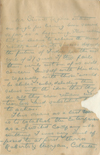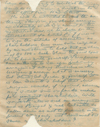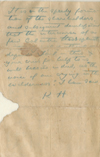Mahatma Letter to Norendro - LMW 2 No. 74
| Quick Facts | |
|---|---|
| People involved | |
| Written by: | Koot Hoomi |
| Received by: | Norendro Nath Sen |
| Sent via: | unknown |
| Dates | |
| Written on: | early 1883 |
| Received on: | April 1883 |
| Other dates: | unknown |
| Places | |
| Sent from: | unknown |
| Received at: | probably Calcutta or Adyar |
| Via: | unknown |
This letter is Letter No. 74 in Letters from the Masters of the Wisdom, Second Series, in which Mahatma Koot Hoomi instructs the highly esteemed Norendro Nath Sen on how to proceed in establishing The Phoenix newspaper.[1]
< Prev letter in LMW 2
Next letter in LMW 2 >
Page 1 transcription, image, and notes
|
NOTE: brackets indicate small pieces torn out of the document. Mr. Sinnett is gone, without one single pie having been secured, so far, as a beginning for [Phoenix]. There remains but one means to achieve the desired result, and, on its success depends the future of India for the next cycle of 27 years. If this fails, then, verily not one of us will concern himself with the Hindus — especially with those "would-be chelas" who, deluding themselves into the idea that they do all they can, remain motionless and substitute [?] to action. This means, as a last res[ort] is to establish the enterprise as a Limited Company – something I was very much opposed to at first. Messrs. Roberts & Morgan, Calcutta |
NOTES:
|
Page 2
|
NOTE: brackets indicate small pieces torn out of the document. have due [auth]ority to establish the Company and will do so [on] receiving directions to that effect from H.S. Olcott. He will be instructed to send the authority. Therefore, you should arrange immediately on Mr. S.’s account for the registration deed, i.e., to choose for the establishment of a limited Co., 7 persons to sign the articles of association as shareholders, even were some compelled by circumstances to hold but one share — of Rs.100 each. Show the good example, to begin with, yourself. Three persons have authority to see — upon preliminary arrangement among themselves – Mr. Morgan and arrange what is necessary, Col. Olcott, Col. Gordon, and yourself. It is Mr. Sinnett’s belief that Mr. Morgan would, if required, advance any small sum or funds needed for nominal shareholders. Will you, I ask, allow such an arrangement and is Bengal and rich Calcutta so fallen down as not to furnish in the present e[me]rgency not “nominal” but seven r[eal] shareholders? |
NOTES:
|
Page 3
|
It is on the speedy formation of the shareholders, and subsequent development that the intercourse of a few Calcutta theosophists with myself and others depends. Fail in this and your cries for help to us will become indeed, as “the voice of one crying in the wilderness”. I have said.
|
NOTES:
|
Context and background
Mr. Jinarajadasa provided this background information:
The recipient of the next letter, Norendro Nath Sen, was a famous Indian patriot and reformer. He was the proprietor and editor of the Indian Mirror of Calcutta, then the leading paper in India voicing the opinions of Indians on political matters. He joined the T.S. soon after the Society began its work in India. He received several letters from the Master K.H., but this is the only one so far found among his papers. It was given to me by his son to be put among the Adyar records. I was then told an interesting fact showing the high regard in which his Master held him. Sometimes late at night, when correcting proofs, Norendro Nath Sen after a hard day’s work would fall asleep over his proofs. More than once, when he woke up, he found the proofs corrected in blue pencil.
The letter deals with the project of the Phoenix newspaper. When the Founders came to India, the editor of the Pioneer, practically the official paper of the British Government then, was Mr. A.P. Sinnett. When he became interested in Theosophy, and came especially under the influence of the personality of the Master K.H., Mr. Sinnett began to show pro-Indian leanings. This was against the policy of the Pioneer and he received notice to quit in November, 1882. At this juncture, it was the earnest desire of the Master K.H. that Mr. Sinnett should not leave India. The Master set on foot a plan to start a new paper, The Phoenix, with Mr. Sinnett as editor, but with Indians as proprietors. Naturally a large sum of money was required as capital, and two or three Indian princes half promised to invest their money in the new venture. Partly owing to Mr. Hume’s machinations, and partly to the spirit of apathy and toadying to Government officials then strong among Indians, the Phoenix project fell through, and Mr. Sinnett left India, never to return. On September 11, 1883, the Master K.H. cabled releasing Mr. Sinnett from his promise not to accept another billet.[3]
Physical description of letter
The original letter is preserved at the Theosophical Society, Adyar, Chennai, India. Mr. Jinarajadasa described the letter in this way:
He [Norendro Nath Sen] received several letters from the Master K.H., but this is the only one so far found among his papers. It was given to me by his son to be put among the Adyar records.[4]
Publication history
Commentary about this letter
Master K. H. demonstrates in this letter a considerable understanding of the political, legal, and financial aspects of establishing a newspaper in India under the British Raj.


